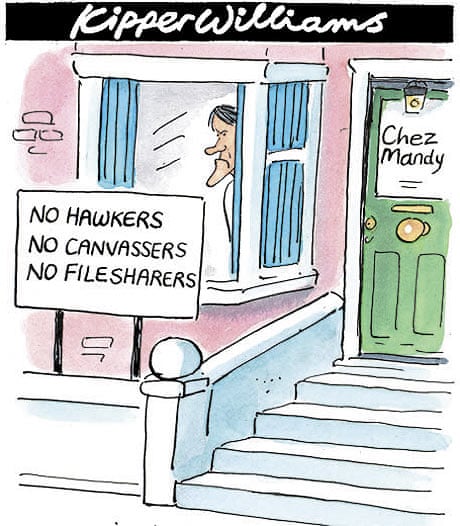Lord Mandelson's proposals to cut off "persistent" file sharers do not make financial sense, according to estimates of its cost put forward by those who would have to implement it.
British Telecom and Carphone Warehouse estimate that running the enforcement system would cost about £2 per broadband line per month - a total of £24 per broadband line per year. With 17.6m broadband connections in the UK as of September, means it would cost £420m annually to run a system to defeat a problem the music industry complains costs it £200m per year.
Lord Mandelson said that "ISPs and rights-holders will share the costs, on the basis of a flat fee that will allow both sides to budget and plan."
If the costs of running the system are equally shared between rights-holders and ISPs, that means that ISPs will have to push up bills for the majority of law-abiding customers who do not download illegally, while the rights-holders spend as much as they claim they are losing.
Reactions from the music and music streaming industry to Lord Mandelson's reasserted determination to cut off "persistent" file-sharers has not been positive either.
For we7, the music streaming website, chief executive Steve Purdham was unimpressed.
"This morning at the government sponsored C&binet forum Peter Mandelson backed a tough three strikes policy for file-sharers, echoing the hard-line position taken in France. This is a move which is directed at protecting the media industry and copyright law but one which entirely misses the heart of the issue. "Piracy is a reaction to an unsustainable situation, where reasonable, legitimate access to music has struggled to match demand. File-sharing sites have risen in the gulf between what consumers wanted and what has been available. Internet users don't want to use p2p networks; most are far from intuitive, full of sub-standard products and leave users' computers open to attack and infection. "In the same way that the vast majority of consumers buy products from reputable retailers and not on the black market, most would rather support artists and their livelihood by consuming licensed music. Creating a variety of reasonable and sustainable models for providing music to consumers is key to ending rampant piracy. This is the approach that should be taken by the government rather than criminalising consumers and driving pirates further into the undergrowth. "At we7, we believe that sustainable ad-funded music is a first step in migrating the pirate to legitimate consumption. In order to keep generating the music we love, artists need to be paid. People want to support the music they care about. But it is not for them to find a way to do that; the onus is on the government and the industry to monetise music instead of demonising and punishing the general public."
The key problem that companies like we7 and Spotify face is that - unlike supermarkets buying products such as DVDs or milk - they cannot, officially, negotiate bulk discounts. Officially, the streaming sites have to pay the same per-song royalty whether they stream 1 millions song per month or 10 million. In internet parlance, music streaming doesn't "scale".
That means, briefly, that music streaming companies can't succeed unless they can find magical ways to generate huge sums of money - which we already know they can't. The availability of piracy, and free sites, and giveaway CDs, and simply having friends who can send you files, means people will only pay for something that's enormously simple to use - such as we7 and Spotify.
Alex Ljung, chief executive and co-founder of SoundCloud - an online audio platform that lets music professionals upload music to let them embed or share it online, said:
"It's unfortunate that the top level conversations around digital music are so focused on strategies for limiting access, when what's needed is more innovation around providing alternatives to illegal file sharing.
"In the few years that the government has poured their time and resources into pushing through unworkable three strikes rules, developers and start-ups have been successfully innovating in the other direction: working directly with artists and labels to provide music fans with accessible, safe, legal options for
streaming and downloading music in ways that benefit the industry."
"There's still a long way to go, but the tech sector success stories far outweigh any of the attempts by governments to directly obstruct or criminalise music file-sharers."





Comments (…)
Sign in or create your Guardian account to join the discussion